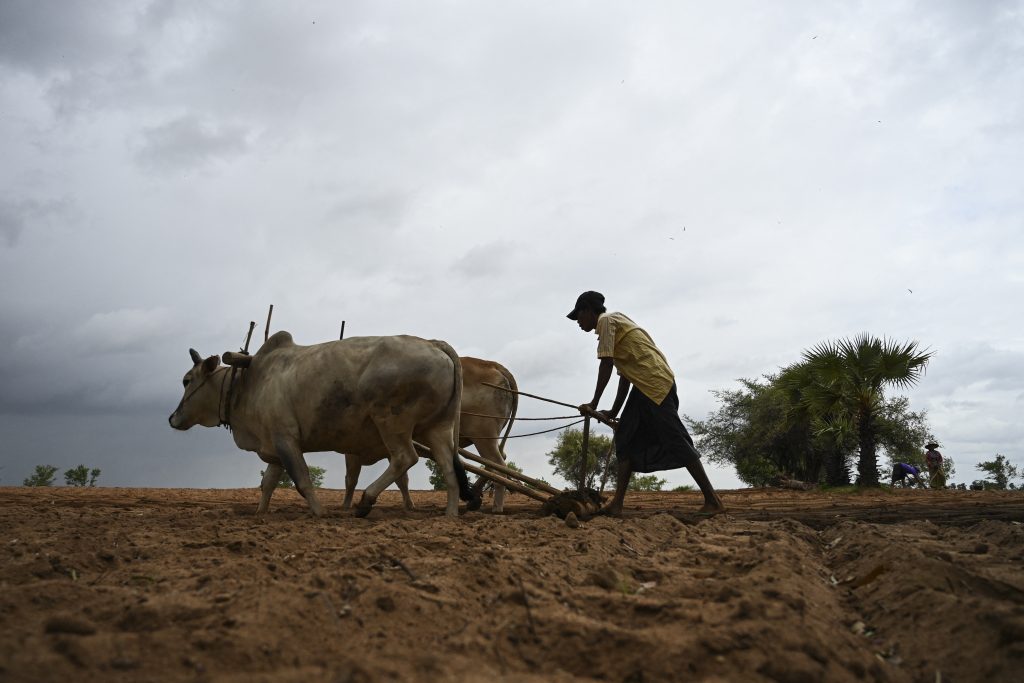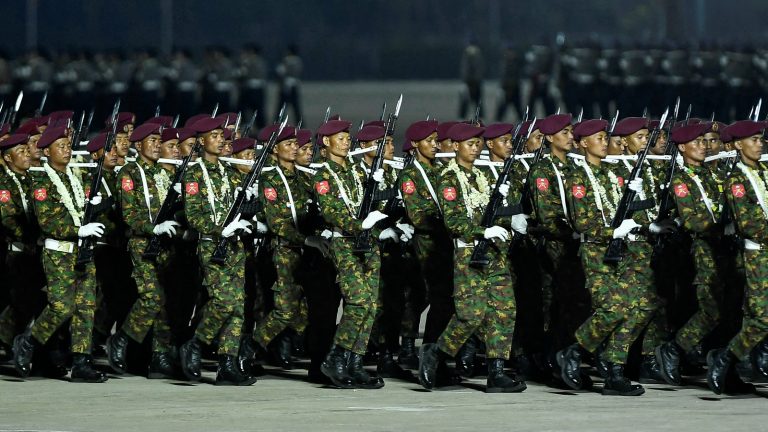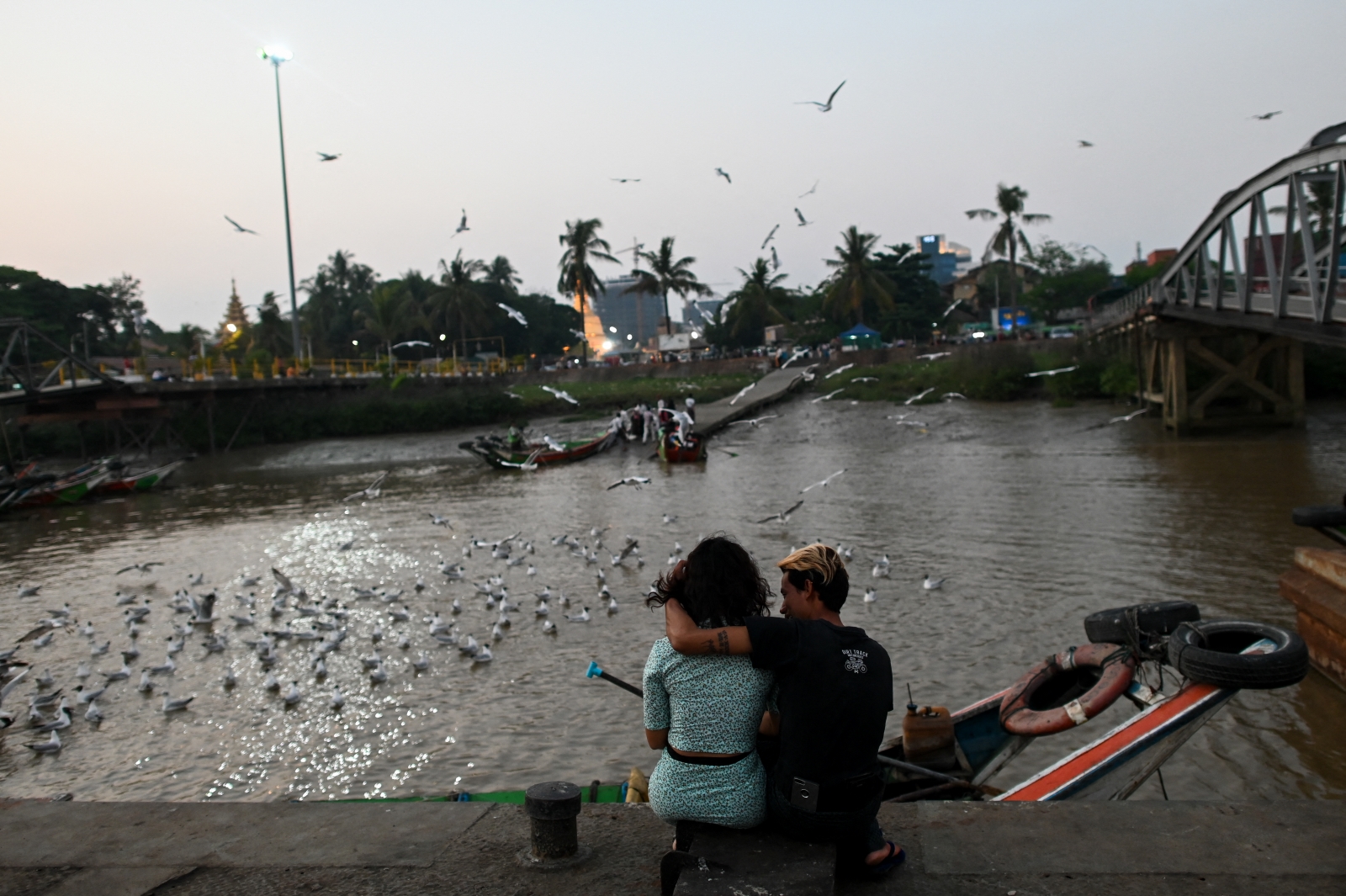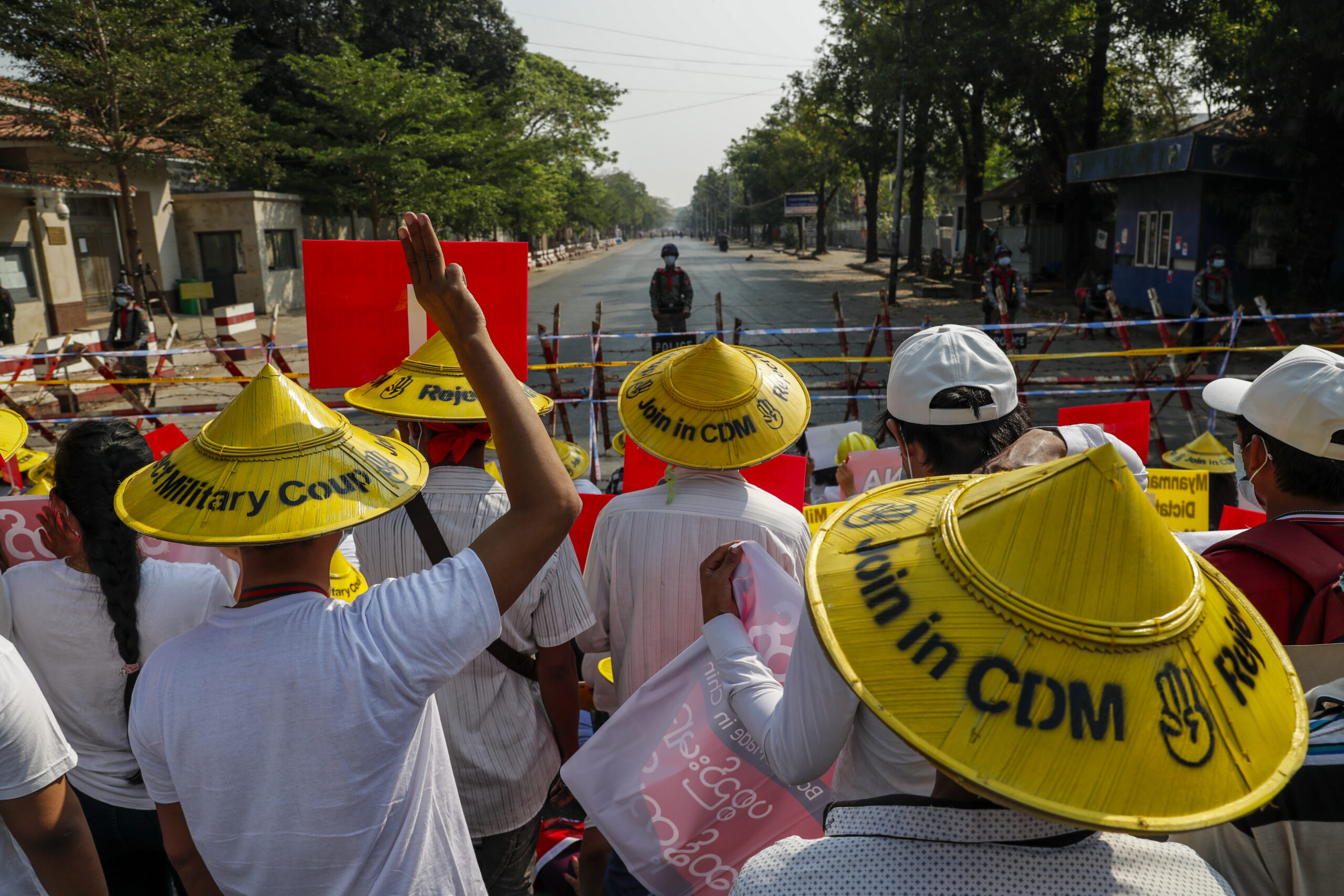Environmentalists fear the junta is ignoring its climate change mitigation commitments and putting climate-vulnerable Myanmar in a more precarious position.
By FRONTIER
The fight to represent Myanmar at the 2021 United Nations Climate Change Conference, also referred to as COP26, unfolded in dramatic fashion.
In April, seven months before the conference convened in Glasgow, Scotland, the pro-military deputy ambassador to the United Kingdom, U Chit Win, took over as charge d’affairs after locking ambassador U Kyaw Zwar Minn out of the embassy building. Kyaw Zwar Minn had declared his loyalty to the elected government, which was overthrown in a military coup last February. As punishment, junta would go on to terminate Kyaw Zwar Minn’s citizenship earlier this month.
Chit Win registered with three associates for COP26, but they were denied entry and removed by the host following public backlash. In the end, no representatives for Myanmar attended the conference.
The two-week summit, held from October 31 to November 13, saw nearly 200 world leaders gather to make commitments to prevent global average temperatures from rising more than 1.5℃ from pre-industrial levels. The meeting also reinforced the Paris Agreement, adopted at COP21 in France in 2015, which requires that nations submit Nationally Determined Contributions (NDCs) on how they plan to reach environmental goals every five years.
Myanmar’s absence was yet another casualty of last year’s military coup and the subsequent legitimacy crisis, as the junta and the National Unity Government vie for recognition on the international stage. The NUG was appointed by lawmakers elected in the 2020 polls after the military refused to recognise the election results and overthrew the National League for Democracy.
As Myanmar faces renewed environmental destruction under the military junta, the country’s conspicuous absence from the recent United Nations climate summit underscores the lack of decisiveness from the international community in addressing last year’s coup.
Parallel commitments
Both the NUG and the junta’s administrative body, the State Administration Council, submitted NDCs in July of last year. The NUG’s was submitted by its acting president Duwa Lashi La and environment minister Tu Hkawng, while the SAC’s was submitted by its environment minister U Khin Maung Yi.
Though the two cabinets may be fiercely opposed to each other, their NDCs are nearly identical. The NUG set a conditional goal of reducing CO2e emissions by 413 million tons and an unconditional target to reduce CO2e emissions by 244 million tons. The junta made similar commitments. (Conditional targets are those that could be reached with international support, while unconditional targets are those a country could reach based on its own capabilities.)
An official from the NUG’s environment ministry said the similarities were no coincidence. “After submitting our NDC in July 2021, the military submitted the same NDC report with a little correction,” he said, claiming the NUG has “ownership” of the NDC.
The pledges are largely in line with commitments made by State Counsellor Daw Aung San Suu Kyi prior to her overthrow and arrest. In December 2020, she said Myanmar would submit its NDC by the end of the year, pledging to reduce emissions by 243 million tons during the virtual Climate Ambition Summit.
She also announced that Myanmar intends to contribute to green recovery by expanding carbon sinks by planting an additional 250,000 hectares of trees. The NUG and SAC both similarly committed to planting 275,000 hectares and to reducing deforestation by 50% by 2030. Both NDCs also aim to increase the total share of renewable energy (solar and wind) from 2,000MW to 3,070MW and to reduce the share of coal from 7,490MW to 2,120MW by the same year.
“The NDCs were prepared during the previous democratic government and initially planned to be submitted in February 2021. However, the coup happened at the same time and the plan was abandoned,” the NUG official said.

Climate goals out of reach
While some were excited by the progress made in Glasgow, others lambasted the conference as an empty public relations exercise. Swedish environmental activist Ms Greta Thunberg called COP26 “a failure” at a protest near the conference.
“It should be obvious that we cannot solve the crisis with the same methods that got us into it in the first place,” Thunberg said. “The COP has turned into a PR event, where leaders are giving beautiful speeches and announcing fancy commitments and targets, while behind the curtains, governments of the Global North countries are still refusing to take any drastic climate action.”
Critics accuse Myanmar’s junta of embodying the disingenuous commitments and transparent PR stunts Thunberg railed against. While the military mirrors the civilian government’s environmental pledges, activists say protections have been collapsing since the coup.
They point to a lack of rule of law, a rise in illicit mining, logging and deforestation — which are undermining Myanmar’s efforts to meet the Paris Agreement’s goals — and dismiss the military’s vague commitments to environmental protection.
“I do not see the SAC implementing any policies – they have no authority and no legitimacy in the eyes of the public. They know that climate change platforms are a route through which they can earn international legitimacy, but it’s just talk,” said Mr Jack Jenkins Hills, an environmental researcher who has worked in Myanmar for more than seven years with CSOs on land and forest issues.
“The military is trying to do their best to show to international communities that they are doing something. They will try to buy the international agencies and NGOs to legitimise their actions on the ground,” said a Karen environmentalist, who asked not to be named for security reasons.
A spokesperson for the World Wildlife Fund-Myanmar said because of the coup, “a full year of targets have been missed”, and there is no sign the junta is implementing the NDC. The spokesperson said civil society organisations remain “strong and active” and are “ready to step up to the challenge of protecting Myanmar’s environment”.
However, “the international community needs to directly support local people in their care for the country’s natural capital,” the spokesperson added.
The NUG environmental official said he is certain the junta will fail to meet the goals in the NDC “due to financial problems and a lack of capacity”. He said the NUG has learned there are insufficient funds for the Myanmar Reforestation and Rehabilitation Program and multiple relevant government departments are short-staffed due to a mass strike by civil servants.
Stalled reforms rolled back
While there was optimism when the NLD came to power in 2015, ending decades of military rule, many were ultimately disappointed with the administration. The environment ministry did not make significant legal reforms and was weak in enforcing policies and made little effort to engage with local communities.
The NLD’s environmental ministry “failed to make amendments to its weak environmental laws, so couldn’t enforce factories and workshops to strictly abide by rules and regulations leading [to] far [more] pollution to environment,” said U Win Myo Thu of ECODEV/ALARM, a local environmental NGO in an interview with The Irrawaddy in December 2020.
But there is near-universal consensus that the situation has dramatically deteriorated under the military regime.
In a statement last year, the London-based Environmental Investigation Agency said that since the coup “it has been impossible for EIA to continue working with local partners and Forest Department officials in moving forward to strengthen forest governance in the country”. It added that efforts by civil society to increase transparency in the forest sector “have been destroyed overnight”.
Mr Ben Hardman, Myanmar Policy and Legal Advisor for environmental NGO Earth Rights International, said the military’s lack of legitimacy and poor relationship with civil society will continue to be roadblocks to any meaningful reform.
“The effectiveness of climate change plans, both for mitigation and adaptation, depend on a government’s ability to work with civil society and other stakeholders. The junta remains unrecognised as a government and is making every effort to destroy civil society,” Hardman said.
A Myanmar-focused business executive in the service industry, who has worked in the country for over a decade, predicted that climate change mitigation under the Myanmar military regime will be even more challenging than under the NLD.
“The rhetoric has changed under the military – there is clearly much less focus on environmental and climate concerns under the regime. Climate was a consistent talking point by the previous civilian government,” he told Frontier on the condition of anonymity.
He said the junta does seem to be trying to pursue solar power, but the process is “a mess”.
“The economic disruption following the coup has also limited expected growth in areas like vehicle energy consumption, as well, which perversely might actually help on climate change,” he added.
A senior executive from a non-profit energy and climate organisation agreed that there are some opportunities in the chaos wrought by the coup.
“Rising diesel prices and declining grid reliability mean that there is ironically a huge economic imperative for communities and businesses to convert to solar or other renewable solutions at scale,” he said.
The executive also urged development partners to “unfreeze their stance on Myanmar” in order to support “climate resilience projects” and said financial institutions should “unstick their funds” and identify ways to finance “decentralized energy solutions”. He added that he is “absolutely not” suggesting that organisations work with the junta, but rather find “alternative ways” via the private and non-profit sectors.
“Development partners, working with the private sector, could design risk mitigation solutions that could help spur important projects in decentralized solar energy and reforestation. Transparent and credible procurement mechanisms should be put in place via neutral parties to bring in utility-scale solar installations at state level,” he argued.

Particularly vulnerable
According to the Global Climate Risk Index, published annually by the NGO Germanwatch, Myanmar is among the countries likely to be the most affected by climate change. The country is prone to landslides and flooding, a situation exacerbated by unsafe mining practices and rampant deforestation.
“[The junta] is increasing defence spending while cutting funding available for Myanmar farming communities who are some of the most vulnerable to climate change anywhere in the world, so its priorities are clear,” said Hardman.
Nearly 800,000 people in Myanmar are now displaced, according to the UN refugee agency, and many are unable to grow the crops they use to sustain their livelihoods.
The NUG official said the military derailed “all the goals from COP26”, and its campaign of violence is only making people more vulnerable to the effects of climate change.
“Many houses in the climate vulnerable regions of the central dry zone such as Sagaing and Magway regions have been burned and destroyed by the military,” he said, adding that “agricultural assets” like machinery, crops, seeds and cattle have also been destroyed.
According to a report in state media on December 13, the military-appointed environment minister Khin Maung Yi said “all stakeholders can work together to address the problems of environmental pollution and climate change”. But the NUG and most independent observers see the junta as an obstacle to these goals, rather than a potential partner.
While the NUG was barred from attending COP26, acting president Duwa Lashi La was permitted to address the United Nations Framework Convention on Climate Change during the summit. He used the opportunity to accuse the military of derailing “the significant momentum that Myanmar had gathered in support of all-inclusive and climate-resilient development”.
“As the world moves toward a climate resilient and net zero economy, the NUG calls for international support so that Myanmar is not left behind. We remain committed to the fight against climate change” he said. “The military junta, however, has been escalating deforestation and resource exploitation, all to fuel its war against its own people.”
This story was produced as part of a grant from UKaid to support climate change and environment-related journalism.







